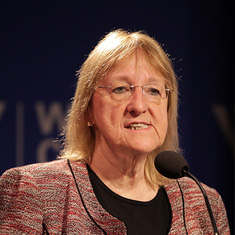-
Emmy Simmons: To Improve Food Security and Prevent Conflict, Think and Commit Long Term
October 4, 2013 By Laura Henson
“Food is really fundamental to people’s daily existence, and the price or the access to that food is clearly important to them, and people will turn out in the streets when that price spike is unanticipated,” says Emmy Simmons, author of Harvesting Peace: Food Security, Conflict, and Cooperation, in this week’s podcast.
Simmons gives an overview of the latest edition of ECSP Report, which examines how conflict affects food security, and how food security affects conflict.
“Food is really fundamental to people’s daily existence, and the price or the access to that food is clearly important to them, and people will turn out in the streets when that price spike is unanticipated,” says Emmy Simmons, author of Harvesting Peace: Food Security, Conflict, and Cooperation, in this week’s podcast.
Simmons gives an overview of the latest edition of ECSP Report, which examines how conflict affects food security, and how food security affects conflict.
The first question, Simmons says, is easy to answer. Conflict affects food security “in every way,” she says. ”It affects availability; it affects access; it affects utilization of food; it affects the predictability and certainty with which people can access their food supplies.”
The second question – how food security affects conflict – “is a heck of a lot harder to answer.” For example, the 2008 global food price spike provoked instability in more than two dozen countries, but food prices were just part of the issue. “Part of the rest of the picture had to do with trends in urbanization,” Simmons says. More than half of the population of Asia and a growing proportion of Africa live in cities, not producing their own food, which means they have no fallback when markets change.
Conflict nearly always has multiple, complex causes, she says. “The conflict people have actually made a coherent and focused effort to understand causality, whereas I think the food security side…our rigorous understanding of causality of food insecurity or food security is actually somewhat deficient.”
Simmons says she found quantitative data on both food security and conflict during her research, but the data is “rarely brought together.” She classified five ways in which food can affect conflict: triggering conflict, catalyzing recurring conflict, building momentum toward conflict, providing incentives to join or support conflict, or sustaining conflict.
For example, in Darfur “the strategy of war was the strategy of destruction of food and the capacity to produce food,” Simmons says. In conflicts like these, agencies like USAID intervene to help under humanitarian imperatives to feed the hungry and rebuild lives, but they “tend to have short attention spans,” she says, despite the fact that “the literature is so strong on this, that recovery from conflict is the work of a generation or more.”
Simmons concludes by encouraging USAID to think more long term and more think micro-economically in their humanitarian interventions in places like Darfur. “How are the communities doing? How are the households doing?” she urged. Paying attention to improving access to food in these contexts is crucial.
She also encouraged more collaboration with the academic world. The conflict analysis community “could contribute through joint analysis to our understanding of how to go forward to address issues and challenges of food security in a time of fragility and conflict and weak governance in so many countries.”
Simmons spoke at the Wilson Center on September 12. Download her slides to follow along.
Friday podcasts are also available for download from iTunes.
 A Publication of the Stimson Center.
A Publication of the Stimson Center.



